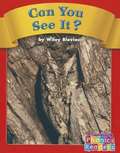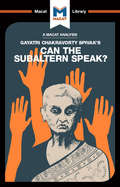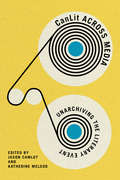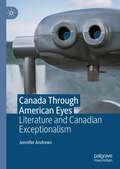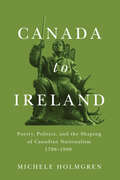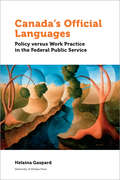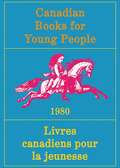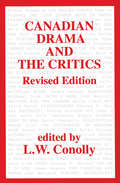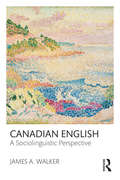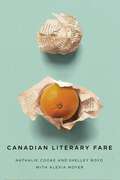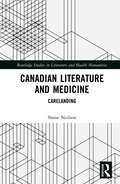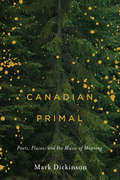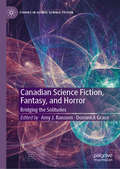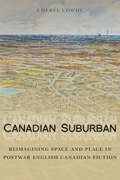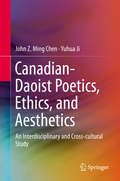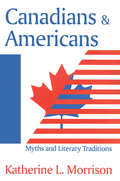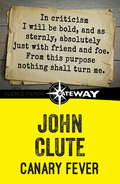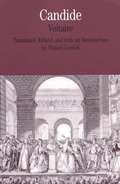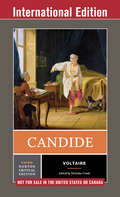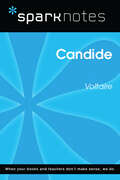- Table View
- List View
Can You See It?
by Wiley BlevinsPhonics Readers is a recognized leader in helping you teach phonics and phonemic awareness, within the context of content-area reading. Content area focus: Camouflage Phonics Skills: short e, r-blends
Can the Subaltern Speak?
by Graham RiachA key theme of Gayatri Spivak's work is agency: the ability of the individual to make their own decisions. While Spivak's main aim is to consider ways in which "subalterns" – her term for the indigenous dispossessed in colonial societies – were able to achieve agency, this paper concentrates specifically on describing the ways in which western scholars inadvertently reproduce hegemonic structures in their work. Spivak is herself a scholar, and she remains acutely aware of the difficulty and dangers of presuming to "speak" for the subalterns she writes about. As such, her work can be seen as predominantly a delicate exercise in the critical thinking skill of interpretation; she looks in detail at issues of meaning, specifically at the real meaning of the available evidence, and her paper is an attempt not only to highlight problems of definition, but to clarify them. What makes this one of the key works of interpretation in the Macat library is, of course, the underlying significance of this work. Interpretation, in this case, is a matter of the difference between allowing subalterns to speak for themselves, and of imposing a mode of "speaking" on them that – however well-intentioned – can be as damaging in the postcolonial world as the agency-stifling political structures of the colonial world itself. By clearing away the detritus of scholarly attempts at interpretation, Spivak takes a stand against a specifically intellectual form of oppression and marginalization.
CanLit Across Media: Unarchiving the Literary Event
by Jason Camlot Katherine McLeodThe materials we turn to for the construction of our literary pasts – the texts, performances, and discussions selected for storage and cataloguing in archives – shape what we know and teach about literature today. The ways in which archival materials have been structured into forms of preservation, in turn, impact their transference and transformation into new forms of presentation and re-presentation. Exploring the production of culture through and outside of the archives that preserve and produce CanLit as an entity, CanLit Across Media asserts that CanLit arises from acts of archival, critical, and creative analysis. Each chapter investigates, challenges, and provokes this premise by examining methods of "unarchiving" Canadian and Indigenous literary texts and events from the 1950s to the present. Engaging with a remediated archive, or "unarchiving," allows the authors and editors to uncover how the materials that document past acts of literary production are transformed into new forms and experiences in the present. The chapters consider literature and literary events that occurred before live audiences or were broadcast, and that are now recorded in print publications and documents, drawings, photographs, flat disc records, magnetic tape, film, videotape, and digitized files. Showcasing the range of methods and theories researchers use to engage with these materials, CanLit Across Media reanimates archives of cultural meaning and literary performance. Contributors include Jordan Abel (University of Alberta), Andrea Beverley (Mount Allison University), Clint Burnham (Simon Fraser University), Jason Camlot (Concordia University), Joel Deshaye (Memorial University of Newfoundland), Deanna Fong (Simon Fraser University), Catherine Hobbs (Library and Archives Canada), Dean Irvine (Agile Humanities), Karl Jirgens (University of Windsor), Marcelle Kosman (University of Alberta), Jessi MacEachern (Concordia University), Katherine McLeod (Concordia University), Linda Morra (Bishop's University), Karis Shearer (University of British Columbia, Okanagan), Felicity Tayler (University of Ottawa), and Darren Wershler (Concordia University).
CanLit Across Media: Unarchiving the Literary Event
by Jason Camlot and Katherine McLeodThe materials we turn to for the construction of our literary pasts - the texts, performances, and discussions selected for storage and cataloguing in archives - shape what we know and teach about literature today. The ways in which archival materials have been structured into forms of preservation, in turn, impact their transference and transformation into new forms of presentation and re-presentation. Exploring the production of culture through and outside of the archives that preserve and produce CanLit as an entity, CanLit Across Media asserts that CanLit arises from acts of archival, critical, and creative analysis. Each chapter investigates, challenges, and provokes this premise by examining methods of "unarchiving" Canadian and Indigenous literary texts and events from the 1950s to the present. Engaging with a remediated archive, or "unarchiving," allows the authors and editors to uncover how the materials that document past acts of literary production are transformed into new forms and experiences in the present. The chapters consider literature and literary events that occurred before live audiences or were broadcast, and that are now recorded in print publications and documents, drawings, photographs, flat disc records, magnetic tape, film, videotape, and digitized files. Showcasing the range of methods and theories researchers use to engage with these materials, CanLit Across Media reanimates archives of cultural meaning and literary performance. Contributors include Jordan Abel (University of Alberta), Andrea Beverley (Mount Allison University), Clint Burnham (Simon Fraser University), Jason Camlot (Concordia University), Joel Deshaye (Memorial University of Newfoundland), Deanna Fong (Simon Fraser University), Catherine Hobbs (Library and Archives Canada), Dean Irvine (Agile Humanities), Karl Jirgens (University of Windsor), Marcelle Kosman (University of Alberta), Jessi MacEachern (Concordia University), Katherine McLeod (Concordia University), Linda Morra (Bishop's University), Karis Shearer (University of British Columbia, Okanagan), Felicity Tayler (University of Ottawa), and Darren Wershler (Concordia University).
Canada Through American Eyes: Literature and Canadian Exceptionalism
by Jennifer AndrewsThis book explores how Canada is imagined primarily by US writers, and what readers and scholars on both sides of the Canada-US border can learn from these recent depictions by examining a selection of US-authored fiction from 9/11 to the present. The novels — and occasionally paintings, films, and musicals — that are the subject of the book provide a deliberately varied set of case studies to probe how US texts, along with works of art produced on both sides of the Canada-US border, uncover moments in Canadian historical and literary studies that have been buried or occluded to protect Canada's self-representation as an exceptional nation.
Canada to Ireland: Poetry, Politics, and the Shaping of Canadian Nationalism, 1788–1900 (Carleton Library Series)
by Michele HolmgrenIn the eighteenth and nineteenth centuries, Irish writers played a key role in transatlantic cultural conversations – among Canada, Britain, France, America, and Indigenous nations – that shaped Canadian nationalism. Nationalism in Ireland was likewise influenced by the literary works of Irish migrants and visitors to Canada.Canada to Ireland explores the poetry and prose of twelve Irish writers and nationalists in Canada between 1788 and 1900, including Thomas Moore, Adam Kidd, Lord Edward Fitzgerald, Thomas D’Arcy McGee, James McCarroll, Nicholas Flood Davin, and Isabella Valancy Crawford. Many of these writers were involved in Irish political causes, including those of the Patriots, the United Irish, Emancipation, Repeal, and Young Ireland, and their work explores the similar ways in which nationalists in Ireland and Indigenous and settler communities in Canada retained their cultural identities and sought autonomy from Britain. Initially writing for an audience in Ireland, they highlighted features of the landscape and culture that they regarded as distinctively Canadian and that were later invoked as powerful unifying symbols by Canadian nationalists. Michele Holmgren shows how these Irish writers and movements are essential to understanding the tenor of early Canadian literary nationalism and political debates concerning Confederation, imperial unity, and western expansion.Canada to Ireland convincingly demonstrates that Canadian cultural nationalism left its mark on both countries. Contemporary decolonization movements in Canada and current cultural exchanges between Ireland and Indigenous peoples make this a timely and relevant study.
Canada’s Official Languages: Policy Versus Work Practice in the Federal Public Service (Politics and Public Policy)
by Helaina GaspardCanada’s official languages legislation fundamentally altered the composition and operational considerations of federal institutions. With legislative change, Canada’s public service has achieved the equitable representation of its two official languages groups, provided services to the public in both official languages, and has codified rights for public servants to work in their official language of choice. On paper, the regime is robust. In practice, there is a persistent divergence between policy and practice, as English dominates as the regular language of work in the federal public service. Through an historical institutionalist lens based on extensive archival research and semi-structured interviews, Gaspard shows that the implementation of official languages policy in the federal public service from 1967–2013 could not challenge the predominance of English as the operating language of the federal public service. The analysis of the roles of actors, ideas and institutions that influenced the policy implementation process show that a lack of structural change, inadequate managerial engagement, and a false sense that both official languages are equally ingrained in the public service explain the persistence of English as the dominant language of work.
Canadian Books for Young People/Livres canadiens pour la jeunesse, 3e (The Royal Society of Canada Special Publications)
by Irma McDonoughThis third, completely revised edition contains hundreds of new entries for a total of almost 2,000 children's books and magazines carefully selected and described by a team of children's librarians. Entries are arranged by subject, with reading levels indicated where necessary, and are also listed in a separate author-title index. A list of prize-winning Canadian children's books and a basic book list for librarians, teachers, and parents are included in this charmingly illustrated volume.
Canadian Drama and the Critics
by L. W. ConollyThe editor of this lively, updated assortment of reviews, interviews and other critical deliberations on contemporary Canadian drama has gathered material from books, theatre and scholarly journals; from major daily newspapers in Canada and abroad; from critics, academics, journalists and playwrights. This new expanded and updated edition of Canadian Drama and the Critics now includes commentary on forty-three English-language plays written during the last fifty years. | |Canadian Drama and the Critics is an enjoyable read that offers an intelligent, wide-ranging overview of modern Canadian plays and playwrights. An ideal companion text to Talonbooks' Modern Canadian Plays Volumes I and II and other anthologies of Canadian drama, Canadian Drama and the Critics also includes detailed production information for the premiere of each play and a comprehensive index.
Canadian English: A Sociolinguistic Perspective
by James A. WalkerThis textbook is the only one of its kind to introduce the study of Canadian English in the context of basic concepts of linguistics and sociolinguistics. The book provides foundational information on linguistic principles and on the different branches of sociolinguistics, ranging from the large-scale ‘macro’ study of language usage (the sociology of language, dialect surveys) to the ‘micro’ study of language use (sociophonetics, sociolinguistic variation and change). Each chapter highlights the different ways of collecting and analyzing data, including census data and historical texts, surveys and questionnaires, publically available corpora, and interviews. Mini-projects at the end of each chapter offer hands-on experience with the methods presented in the chapter. In addition to discussing the classic works in the study of Canadian English, this book engages with such contemporary issues as new-dialect formation, language and social identity, and ongoing language change, making it key reading for students taking courses in the areas of Canadian English, varieties of English, language variation, and sociolinguistics.
Canadian Hockey Literature
by Jason BlakeHockey occupies a prominent place in the Canadian cultural lexicon, as evidenced by the wealth of hockey-centred stories and novels published within Canada. In this exciting new work, Jason Blake takes readers on a thematic journey through Canadian hockey literature, examining five common themes - nationhood, the hockey dream, violence, national identity, and family - as they appear in hockey fiction.Blake examines the work of such authors as Mordecai Richler, David Adams Richards, Paul Quarrington, and Richard B. Wright, arguing that a study of contemporary hockey fiction exposes a troubled relationship with the national sport. Rather than the storybook happy ending common in sports literature of previous generations, Blake finds that today's fiction portrays hockey as an often-glorified sport that in fact leads to broken lives and ironic outlooks. The first book to focus exclusively on hockey in print, Canadian Hockey Literature is an accessible work that challenges popular perceptions of a much-beloved national pastime.
Canadian Literary Fare (Carleton Library Series)
by Shelley Boyd Nathalie CookeWhen writers place food in front of their characters – who after all do not need sustenance – they are asking readers to be alert to the meaning and implication of food choices. As readers begin to listen closely to these cues, they become attuned to increasingly layered stories about why it matters what foods are selected, prepared, served, or shared, and with whom, where, and when. In Canadian Literary Fare Nathalie Cooke and Shelley Boyd explore food voices in a wide range of Canadian fiction, drama, and poetry, drawing from their formational blog series with Alexia Moyer. Thirteen short vignettes delve into metaphorical taste sensations, telling of how single ingredients such as garlic or ginger, or food items such as butter tarts or bannock, can pack a hefty symbolic punch in literary contexts. A chapter on Canada’s public markets finds literary food voices sounding a largely positive note, just as Canadian journalists trumpet Canada’s bountiful and diverse foodways. But in chapters on literary representations of bison and Kraft Dinner, Cooke and Boyd bear witness to narratives of hunger, food scarcity, and social inequality with poignancy and insistence.Canadian Literary Fare pays heed to food voices in the works of Tomson Highway, Rabindranath Maharaj, Alice Munro, M. NourbeSe Philip, Eden Robinson, Fred Wah, and more, inviting readers to listen for stories of foodways in the literatures of Canada and beyond.
Canadian Literature and Medicine: Carelanding (Routledge Studies in Literature and Health Humanities)
by Shane NeilsonCanadian Literature and Medicine breaks new ground by formulating a series of frameworks with which to read and interpret a national literature derived from the very fabric of that literature – in this case Canadian. Canadian literature is of particular interest because of its consideration of coloniality, Indigeneity, and coincident development alongside a nascent socialized medical system currently under threat from neoliberalism. The first chapters of the book carefully track the development of Canada’s socialized medical system as it manifests in the imaginations of the nation’s poets and authors who depict care. Reciprocal flows are investigated in which these poets and authors are quoted in policy documents. The archive-based methodology is sustained in subsequent chapters that rely upon a unique interdisciplinary mix of medical history, philosophy of medicine, medical policy, theory inherent to the field of Canadian literature (focusing in particular on the garrison mentality as a form of aesthetic protest and the feminist ethics of care), and Indigenous ways of knowing.
Canadian Primal: Poets, Places, and the Music of Meaning
by Mark DickinsonOver the past few decades, a group of writers we might call the Thinking and Singing poets have stood at the forefront of poetry in Canada. These five poets – Dennis Lee, Don McKay, Robert Bringhurst, Jan Zwicky, and Tim Lilburn – are major voices in an era of ecological devastation and spiritual unease. Their diverse, questioning work suggests new ways to confront some of the most pressing issues of our time.In vibrant prose, Mark Dickinson explores the relationship between the lives of these poets and their writing, examining their intersecting careers and friendships, and the ways they learned from and challenged one another. Canadian Primal uses an unconventional approach, blending biography with literary analysis and drawing from meetings and correspondence with each poet over many years to trace the people and events that inspired the creation of important texts. Dickinson tracks how each of the writers arrived at poetry as a way of being, and at the heart of their poetics he finds both a musical intelligence and the crucial importance of the land.Canadian Primal is literary biography reconceived as an adventure of the mind, body, and spirit. Ebullient, intelligent, and eminently readable, it reminds us that we can live on the earth in a different way, true to the defining experiences of our lives, surrounded by meaning and presence beyond our imagining.
Canadian Science Fiction, Fantasy, and Horror: Bridging the Solitudes (Studies in Global Science Fiction)
by Amy J. Ransom Dominick GraceCanadian Science Fiction, Fantasy, and Horror: Bridging the Solitudes exposes the limitations of the solitudes concept so often applied uncritically to the Canadian experience. This volume examines Canadian and Québécois literature of the fantastic across its genres—such as science fiction, fantasy, horror, indigenous futurism, and others—and considers how its interrogation of colonialism, nationalism, race, and gender works to bridge multiple solitudes. Utilizing a transnational lens, this volume reveals how the fantastic is ready-made for exploring, in non-literal terms, the complex and problematic nature of intercultural engagement.
Canadian Suburban: Reimagining Space and Place in Postwar English Canadian Fiction
by Cheryl CowdyThough a large proportion of Canadians live in suburban communities, the Canadian cultural imaginary is filled with other landscapes. The wilderness, the prairie, cityscapes, and small towns are the settings by which we define our nation, rather than the strip mall, the single-family home, and the developing subdivision, which for many are ubiquitous features of everyday life.Canadian Suburban considers the cultures of suburbia as they are articulated in English Canadian fiction published from the 1960s to the present. Cheryl Cowdy begins her excursion through novels set between 1945 and 1970, the heyday of modern suburban development, with works by canonical authors such as Margaret Laurence, Richard B. Wright, Margaret Atwood, and Barbara Gowdy. Her investigation then turns to the meaning of the suburbs within fiction set after the 1970s, when a more corporate model of suburbanization prevailed, and ends with an investigation of how writers from immigrant and racialized communities are radically transforming the suburban imaginary. Cowdy argues there is no one authentic suburban imaginary but multiple, at times contradictory, representations that disrupt prevalent assumptions about suburban homogeneity.Canadian Suburban provides a foundation for understanding the literary history of suburbia and a refreshing reassessment of the role of space and place in Canadian culture and identity.
Canadian-Daoist Poetics, Ethics, and Aesthetics: An Interdisciplinary and Cross-cultural Study
by John Z. Ming Chen Yuhua JiThis monograph takes an interdisciplinary and cross-cultural approach to 20th and 21st -century Canadian Daoist poetry, fiction and criticism in comparative, innovative and engaging ways. Of particular interest are the authors' refreshing insights into such holistic and topical issues as the globalization of concepts of the Dao, the Yin/Yang, the Heaven-Earth-Humanity triad, the Four Greats, Five Phases, Non-action and so on, as expressed in Canadian literature and criticism - which produces Canadian-constructed Daoist poetics, ethics and aesthetics. Readers will come to understand and appreciate the social and ecological significance of, formal innovations, moral sensitivity, aesthetic principles and ideological complexity in Canadian-Daoist works.
Canadians and Americans: Myths and Literary Traditions
by Katherine L. MorrisonMuch can be learned from a nation's literature. Examining three hundred years of cultural traditions, Katherine L. Morrison, a former American, now a Canadian, takes the reader through the historical, political, and sociological milieu of Canada and the United States to dispel misconceptions that they share near-identical social attitudes and historical experiences.To most Americans and much of the rest of the world, America and Canada differ little except in terms of climate. It is true that they share a common British heritage and immigration patterns, but there are subtle cultural differences between the two countries. These may appear insignificant to Americans, but they are not insignificant to Canadians. Comparing mythologies each of the countries share about the other, the author examines national views of their histories, from the common origin of both nations in the American Revolution, through the two world wars. She also examines the role of nature and images of place and home in Canadian and American literary writing, noting the disparate historical development of the two national literatures. Using specific works by recognized authors of their time, Morrison considers the role of religion and the church, violence and the law, and humor and satire, in the literature of both countries. The book also explores the role of women, race, and class in the literature of both countries. It concludes with a discussion of the tenacity of national myths, and draws some tentative conclusions.Now published in paperback in the United States, Morrison's broad-based approach to a largely unexplored subject will invite future study as well as improve understanding between Canada and the United States. Canadians and Americans will be of interest to cultural historians, American studies specialists, political scientists, and sociologists.
Canary Fever
by John CluteCanary Fever is a collection of reviews about the most significant literatures of the twenty-first century: science fiction, fantasy and horror: the literatures Clute argues should be recognized as the central modes of fantastika in our times. The title refers to the canary in the coal mine, who whiffs gas and dies to save miners; reviewers of fantastika can find themselves in a similar position, though words can only hurt us.
Canary Fever
by John CluteCanary Fever is a collection of reviews about the most significant literatures of the twenty-first century: science fiction, fantasy and horror: the literatures Clute argues should be recognized as the central modes of fantastika in our times. The title refers to the canary in the coal mine, who whiffs gas and dies to save miners; reviewers of fantastika can find themselves in a similar position, though words can only hurt us.
Cancelled Words: Rediscovering Thomas Hardy
by Rosemarie MorganThe manuscript of Hardy's first great novel Far From the Madding Crowd vanished shortly after its first publication. Rediscovered in 1918 it sheds remarkable new light on the whole of Hardy's work. The manuscript pages, some of which are reproduced here in facsimile, reveal Hardy's original composition in the novel, and the reluctantly `cancelled words' which were the result of a long struggle with Sir Leslie Stephen, Hardy's editor. Cancelled Words reveals the manner in which Hardy worked, his resistance to censorship, his obsessive attention to detail and precision, and the often concealed processes underlying his authorship. Ultimately, it serves to shape our understanding of the development of the modern novel.
Cancer Poetry
by Iain TwiddyThis is the first critical study to offer a sustained analysis of the theme of cancer in contemporary poetry. In discussing works by major poets, including Paul Muldoon, Jo Shapcott and Christopher Reid, Cancer Poetry traces the complex ways in which poets represent cancer, and assesses how poetry can be instrumental to emotional recovery.
Candide
by Francois VoltaireCandide, Voltaire's biting portrayal of eighteenth-century European society, is a central text of the Enlightenment and essential reading for history students today. Preserving the text's provocative nature, Daniel Gordon's new translation enhances Candide's read-ability and highlights the text's wit and satire for twentieth-century readers. The introduction places the work and its author in historical context, showing students how the complexities of Voltaire's life relate to the events, philosophy, and characters of Candide. A related documents section -- with personal correspondence to and from Voltaire -- gives students another lens through which to view this influential thinker. Helpful editorial features include explanatory notes throughout the text and a chronology of Voltaire's life.
Candide (Norton Critical Editions #0)
by Voltaire Nicholas CronkCandide has been delighting readers since 1759 with its satiric wit, provocations, and warnings. The novella has never been out of print and has been translated into every conceivable language. The text of this Norton Critical Edition remains that of Robert M. Adams’s superlative translation, accompanied by explanatory annotations. The Norton Critical Edition also includes: · A full introduction by Nicholas Cronk. · Six background studies of Enlightenment ideas and themes (by Richard Holmes, Adam Gopnik, W. H. Barber, Dennis Fletcher, Haydn Mason, and Nicholas Cronk), five of these new to the Third Edition. · Seven critical essays—five of them new to this edition—representing a wide range of approaches to Candide. Contributors include J. G. Weightman, Robin Howells, James J. Lynch, Philip Stewart, Erich Auerbach, and Jean Starobinski. · A revised and expanded Selected Bibliography.
Candide (SparkNotes Literature Guide Series)
by SparkNotesCandide (SparkNotes Literature Guide) by Voltaire Making the reading experience fun! Created by Harvard students for students everywhere, SparkNotes is a new breed of study guide: smarter, better, faster.Geared to what today's students need to know, SparkNotes provides:chapter-by-chapter analysis explanations of key themes, motifs, and symbols a review quiz and essay topicsLively and accessible, these guides are perfect for late-night studying and writing papers.
